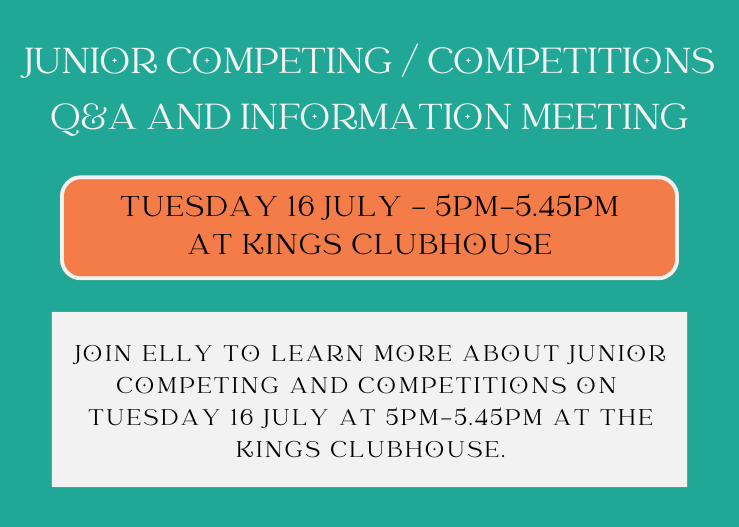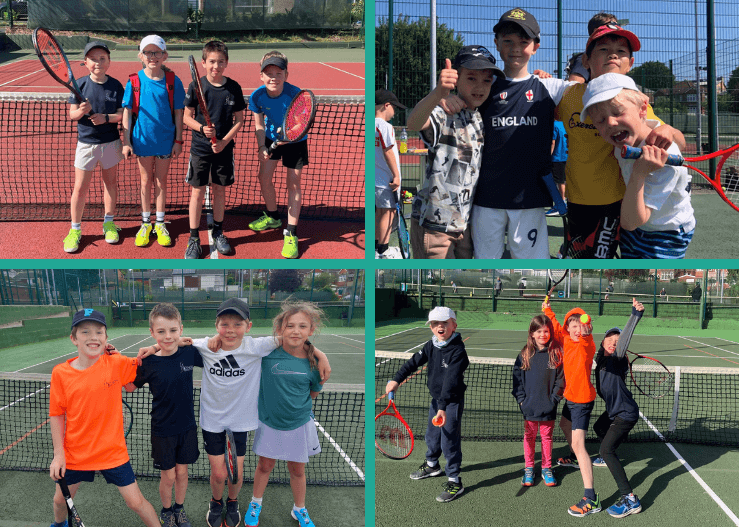How to start competing
Most children’s competitive tennis journey will begin with Junior League, Team Tennis, Group Training and moving to Individual Lessons. Elly explains how these all work, the expectations, the level and training involved. To end, there is probably one of the most important sections about how parents can support their children during their tennis competition journey.

Junior League (Summer & Winter) and Team Tennis
Where children play singles and doubles (U9 and older) with friends from their club against other Avon tennis clubs.
Group Training
The purpose is to deliver a high volume of hitting, at the early stages building technique on a basic level and to understand the game of tennis. At a higher level group training is tactically based with individual reminders about technical developments in individual lessons.
Individual Lessons
We don’t push these too early, but tennis is an early development sport and children can learn good technique at a young age. However, the skills they learn with group training and other sports will help. If your child is already keen at age 7 then it’s worth having an individual lesson, even if it’s 30 mins a week.
Next Steps
Junior League
- Expectations; your child can rally on their colour ball and serve consistently into the correct boxes. They can keep score and understand court positions for singles and doubles
- Level; this is not objective, there are Division 1 & 2 and the coach at the club will enter the divisions based on the level of player that they have. If a club has people who are playing a lot at a high level then children may have to reach a higher level to play in these teams, or the coach will enter multiple teams for age groups.
- Volume of Training; again this differs, we would expect 2 – 3 hours of training a week and accessing some individual lessons which can be adhoc and not every single week. This is not always necessary but a good guideline for you as parents to then expect your child to be comfortable playing matches.
External Tournaments – Grades 4 & 5
- Expectations; your child can build a point using groundstrokes, serves and returns, and be more technically sound with all shots. You don’t have to be amazing to enter these tournaments but realise that you will often play against children who are training more than those who are just playing league matches. Your child should have shown an interest in competing and wanting to play more matches than just Junior League.
- Level; Grade 5 is a local level tournament, Grade 4 is a county level tournament, so you can expect to meet some county players in both these levels, but also others starting out on their competition journey.
- Volume of Training; this could still be 2 – 3 hours a week but the important factor here is having a consistent individual lesson. These accelerate technique improvement which is necessary at this level. Training could also go up to 4 – 5 hours.
External Tournaments – Grades 2 & 3
- Expectations; your child is technically sound in groundstrokes and serve and return, they can play at the net but may still have some soft skills to develop dependent on hours spent on court in the past year or two. Your child has competed regularly for at least a year and is having success in Grade 4 tournaments.
- Level;Grade 3 is a Regional level tournament, Grade 2 is a National level tournament. Your child would be participating in county training and to be at the right level for Grade 2 they would be being invited to regional training sessions. For Grade 3 tournaments you have to gain enough ranking points to get in. So there has to have been success in the Grade 4/5 tournaments before considering Grade 3. The Grade 3 environment is highly competitive so as the parent it’s important you support your child when they first start playing at this level…and again the same case for Grade 2 which is another step up.
- Volume of Training; If the goal is to compete at Grade 3 level, then 2 x 2 hour squad training is necessary, 1/1.5 hour individual lesson per week, and then outside of that 2 – 3 hours working with hitters/another group session/another individual hour.
Key Points
- No tennis player has exactly the same journey, never compare to anyone else. Every family has a different set up/needs/wants and tennis is heavily reliant on supportive parents and families because of the brilliant level that can be reached but the hours of time that it takes. Always look at what will work for you as a family to support your child’s love for it.
- If having success in Grade 4/5 tournaments you do need to look at ranking points for Grade 3s – there may be a Grade 3 that’s nice and local but if you don’t have enough ranking points you won’t get in. So you have to be a bit savvy with this. It’s best not to talk too much about ranking points and just keep an eye on it, unless that is something that drives your child!
- Friendships are important due to the individual nature of the sport, playing outside of training, building these friendships will keep your child loving the sport and gaining the life skills that tennis provides.
- Winning is absolutely not important, children are by themselves, on a tennis court learning to play the game to start off with…unless you’ve played tennis or an individual sport it’s very difficult to understand what it’s like. They are being amazing just going out there. Try to leave them to it. They are children and they are sponges, they will be processing so much information during a match. They don’t need to be quizzed or questioned and you should always let them have 30 minutes before talking to them about a match. It is so important that parents give children their space – this goes for Red Ball (Under 8) matches too! If a coach asks you to keep score then try to do just that and if they can do it, leave them to it. If they are playing matches at an early age it’s all about learning to play the game, don’t get too excited about winning.
Parents – what you can do to help your child enjoy matchplay
- Treat a tournament as if it’s a normal thing to do, and everyone does them, no big deal
- Be relaxed, control your own emotions, do not talk about tennis on the way to a match or to a lesson – believe it or not your child will be thinking things through anyway
- Do something fun after the tournament win or loss, make a day trip of it somewhere nice so it’s not all about the tournament
- See what tournaments friends at the club are entering and go along together so in between matches they can chat/play and relax
- At first make sure your child has everything they need, racket, water bottle – don’t faff around them before a match, when they get to age 10 they should be getting everything ready themselves and if they forget something they will definitely remember it next time!
- Allow them to problem solve outside of tennis, and allow them to make mistakes.
- Don’t complain about the distance to a tournament, or how much all their training costs (discuss it when they are not around!!) – if they hear this type of thing it adds pressure to them….in their heads all they are doing is pursuing something they love to do
- Don’t carry their tennis bag – if they are fit enough to play tennis they can carry their own bag…
Helpful Links
How to Start Competing
Getting Into Tennis & How To Start Competing | LTA
Parents information/Guidance
Parents’ Area | Competitive Tennis Player Support | LTA
Junior Competitions
Junior Tennis Competitions | LTA
Avon County Tennis
Avon Tennis




